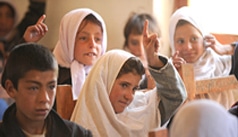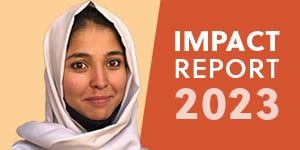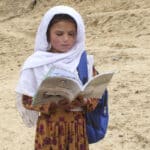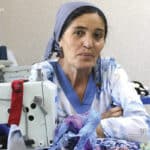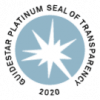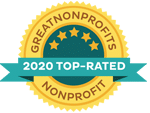Early Learning in Pakistan
By Libby Daghlian
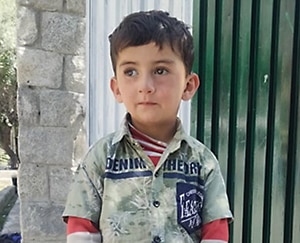
Nestled in the breathtaking mountains of Pakistan’s Gilgit-Baltistan region, the city of Dain is home to a thoughtful young preschooler named Moheed.
Coming from a modest home, Moheed spent the first years of his life close to his mother Zaheera, observing her daily routines and responsibilities, and testing the limits of his quickly developing skills. Although this time together was precious, Zaheera was determined to give Moheed a strong start to his education, which meant searching for an early childhood center (preschool) in which he could enroll.
In Gilgit-Baltistan, like many parts of the world, early childhood education and care is in short supply. Despite strong evidence of the benefits of early learning and development opportunities, preschool remains underfunded and undervalued compared to other stages of the educational journey. While there is a great deal that parents and caregivers can do to support this period of rapid cognitive and physical development, balancing these demands with work, maintaining the home, and other caring responsibilities makes it challenging.
The story is in the data
The fertility rate in Gilgit-Baltistan is 4.6 children per woman, so parents and families must manage the care of multiple children at many different stages of development. The data show the precarious nature of this situation. According to a 2017 report from UNICEF1, more than 27% of Gilgit-Baltistan children aged 3 to 5 had been left in the care of another child under the age of 10 in the past week. The same report showed that close to 40% of children aged 3 to 5 in the region were not on track in at least four major developmental categories, including literacy-numeracy, physical, social-emotional, and learning.
Further investigation revealed that families lacked many of the basic resources needed to supply an enriching learning environment at home. Only 6% of children 3 to 5 years old had access to three or more books at home, and only 31% reported having a caregiver engage the child in a learning activity in the prior week. Looking at fathers’ involvement in learning activities specifically, the rate was abysmal, at just 2%.
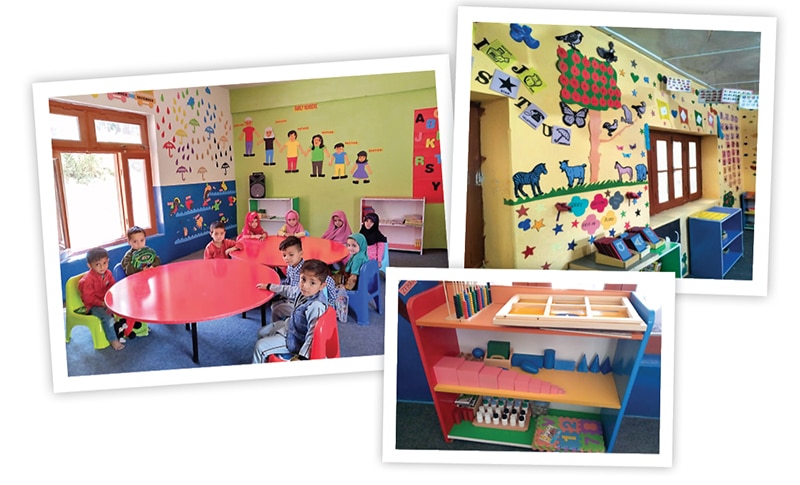
Zaheera knew what she was up against, but also had a clear vision for her son’s educational journey. Although she did not have the opportunity to attend preschool herself as a child, she had taken the time to learn about its benefits. It was both validating and delightful to see these benefits come to life when Moheed started at his new school.
“I took a leap of faith and enrolled my son in the Early Childhood Development Center, Dain,” said Zaheera. “Within a remarkably short period, I observed positive changes in my son’s behavior. He has started to develop good habits, such as organizing his belongings, greeting others with respect, brushing his teeth regularly, and neatly folding his clothes.”
Deepening our shared commitment to early childhood education
Early childhood education has the potential to be transformative for communities. Not only can these programs improve school readiness among children and boost social-emotional skills, they also have the potential to close social mobility and achievement gaps. In very low-income communities where families may already be strapped for time and resources, these interventions are critical for community development and supporting a new generation of engaged and capable leaders, workers, and families.
The impact is not only borne out in study after study from different parts of the world but also demonstrated in the demand among families.2 Parents and caregivers like Zaheera benefit from high-quality early childhood education both in terms of their child’s development and their ability to invest in other areas such as work, homemaking, community involvement, and respite from the demands of caring for small children.
The role of teachers
Teachers like Muhammad Tahir are invaluable in not only providing quality education to these children but also in their efforts to change attitudes in their communities. In a small town in the Diamer Valley, Muhammad has had to navigate conservative beliefs about girls’ education, gently changing minds along the way.
With no other schools nearby, Muhammad had to forge his own way. With the help of CAI and our local partner, the Moawin Foundation, he was able to identify a building to house his small school. Starting with just a few students, demand for Muhammad’s school quickly grew as parents saw the positive impact on local children. “Chilas is a conservative area, where parents were initially hesitant to send their daughters to school,” he said. “As they observed my efforts and the impact on children, they started sending more girls to the school. I am hopeful that this school will make a significant impact on the lives of children in the community.”
Muhammad is one of 695 teachers supported and trained by Central Asia Institute. Of these, 57 are specifically trained in early childhood education. For CAI, the commitment to early childhood education grew out of attention to educational research, as well as the demand of our communities.
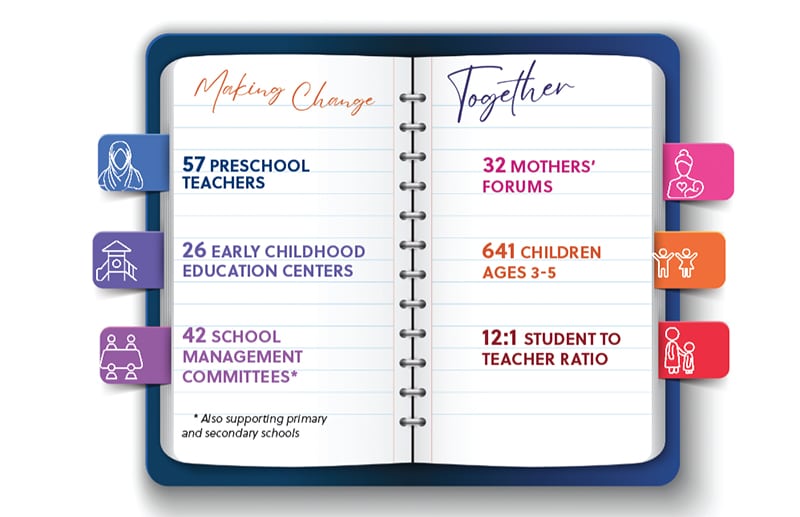
Making change, together
Working hand in hand with our local partner and community leaders, CAI has increased investment in early childhood education in Pakistan through the establishment of new centers, training and hiring new teachers, and finding creative ways to keep families and parents engaged.
Throughout 2023, Central Asia Institute has expanded our early childhood education footprint through the addition of 10 new centers, bringing the total to 26 preschools that serve 641 children. Fifty-seven teachers have been trained in child development, kindergarten readiness, and Montessori methods, providing an important complement to their formal training. But the investment does not stop with the school.
To provide comprehensive and thoughtful support to the children and their families, “Mothers’ Forums” have been established at 32 schools. In a cultural context where women are often discouraged from seeking leadership positions, these forums provide an empowering space for women to become true advocates for their children. In the words of our local partner, the Moawin Foundation, the forums are “powerful platforms for empowering mothers and nurturing a culture of active participation in their children’s education journey.”
The future is bright
In a place like Gilgit-Baltistan, the challenges are intense. The poor economic context combined with a high prevalence of child labor, domestic violence, and early marriage put children in a particularly vulnerable position. Yet, the very communities grappling with these pain points are also a source of tremendous hope.
Women are leading the charge toward a brighter future. More and more women and girls are standing up for their rights and paving the way for gender equity and education in their region. Zaheera is enthusiastic about her role in this change. She knows that her decisions for Moheed are part of building a new generation of educated citizens and leaders. And Central Asia Institute is proud to stand by her side.
1Planning & Development Department, Government of the Gilgit-Baltistan and UNICEF Pakistan. 2017. GB Multiple Indicator Cluster Survey, 2016-17, F report. Gilgit, Pakistan: P&D Department, Government of the Gilgit-Baltistan and UNICEF Pakistan.
2Isaacs J and Roessel E. 2008. Impacts of Early Childhood Programs. Brookings.
